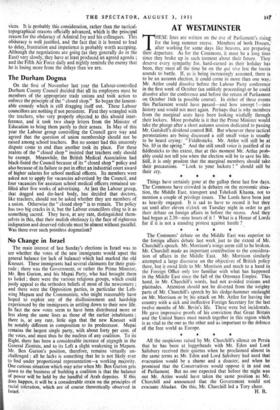No Change in Israel
The main interest of last Sunday's elections in Israel was to see whether the votes of the new immigrants would upset the general balance (or lack of balance) which had marked the old Knesset. These immigrants had several claimants for their grati- tude ; there was the Government, or rather the Prime Minister, Mr. Ben Gurion, and his Mapai Party, who had brought them to IsrAel ; there were the various religious. groups, which could justly appeal to the orthodox beliefs of most of the newcomers ; and there were the Opposition parties, in particular the Left- wing Mapam and the Communists, who might reasonably have hoped to exploit any of the disillusionment and hardship experienced by the immigrants in settling down to their new life. In fact the new votes seem to have been distributed more or less along the same lines as those of the- earlier inhabitants ; there is, at any rate, little sign that the new Knesset will be notably different in composition to its predecessor. Mapai remains the largest single party, with about forty per cent. of the votes, and must thus be the nucleus of any coalition. To its Right, there has been a considerable increase of stngth in the General Zionists, and to its Left a slight weakening in Mapam. Mr. Ben Gurion's position, therefore, remains virtually un- challenged ; all he lacks is something that he is not likely ever to find under -proportional representation—a working majority. One curious situation which may arise when Mr. Ben Gurion gets down to the business of building a coalition is that the balance of power will be held by the handful of Arab deputies. If this does happen, it will be a considerable strain on the principles of racial toleration, which are of course theoretically observed in Israel.`.






























 Previous page
Previous page